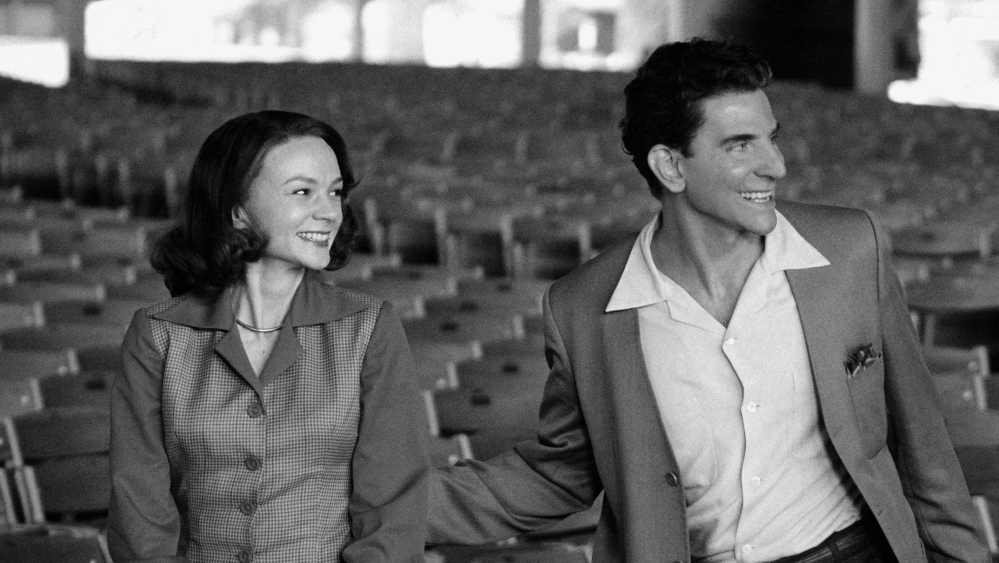Maestro can count among its producers two directors who could justifiably be recipients of that title in the film world. We can only imagine how Martin Scorsese and Steven Spielberg would have approached this biopic of the first great American conductor and composer, and we are frequently forced to as Bradley Cooper’s approach makes a few odd choices, and only latterly finds the emotion within Leonard Bernstein’s divided loyalties and fractured persona.
Let’s start with the Elephant Man in the room: Cooper has, for reasons best known to himself, appeared on stage in the West End as Joseph Merrick without prosthetics but here feels the need to disappear behind a one in his attempt to better resemble Bernstein. The Anti-Defamation League say it’s not antisemitic and Cooper has the support of Bernstein’s three children, but – especially when he’s playing opposite the very English Carey Mulligan as Bernstein’s Costa Rican-Chilean wife – it simply feels as if Cooper doesn’t have the faith in his own acting abilities to deliver a convincing performance without it.

If the prosthetic nose has had a transformative effect on his performance, then at least it’s to the film’s benefit. Bernstein is pitched by Maestro as being the most charismatic man in any room, someone who was not only a conductor, pianist and composer, but an educator and a humanitarian. Cooper delivers this sense absolutely, a breezy and effortless charm that magnetizes those around him, even when they’re less than convinced by his actions. Mulligan also has an efficient sparkle but is always, inevitably, in her husband’s shadow.
The script, by Cooper and Spotlight/First Man scribe Josh Singer, seems uncertain how to best inform us of Bernstein’s achievements. Those unfamiliar with classical music may not know the composer beyond On The Town or West Side Story, and there’s a cute sailor-suit dance moment early on to make reference to the former. But the best principle for a director or a screenwriter must surely be “show, don’t tell” and somehow Maestro does both: showing a young Bernstein filling in for guest conductor Bruno Walter with the New York Philharmonic at the age of just twenty-five, but then taking not one but two opportunities to list out at tedious length Bernstein’s compositional and musical achievements.

Maestro’s central thesis seems to be that Bernstein, the constant polymath, is a better composer/ conductor / pianist than he is a husband / father / lover. It does struggle to demonstrate his skills in the former set, save for a triumphant performance in Ely Cathedral in Cambridgeshire where he conducted Mahler’s 2nd Symphony in 1973. Other than that, we have to take as a given the musical skills, while Cooper and Singer explore his personal relationships.
Leonard and Felicia experience a giddy, whirlwind romance, signified by the giddy, whirlwind camerawork that feels slightly at odds with Matthew Libatique’s grainy cinematography. But Bernstein’s complex sexuality is reduced to the occasional adulterous handhold or hallway kiss, acknowledged by his family if not by the man himself. But when Felicia falls ill, Leonard once again plays the role of devoted husband and father. Commentators are still divided over the exact nature of Bernstein’s orientation but Cooper suggests it’s irrelevant; that being a devoted family man and a husband dedicated to his ailing wife was sufficient, and it’s in this final act where Maestro finally finds some emotional grounding and honesty.

But most of the odd choices, beyond the authentic proboscis, can be attributed in some way to Cooper either as writer or director. A switch from black and white to colour cinematography feels unnecessary, while odd moments are strangely attributed: some of his West Side Story score plays simply over the end of a car journey. There’s also a lacking in sense of time and place, and some odd shot framing choices, such as a scene where the couple argue in a locked off single shot, seemingly only framed that way to allow for the image of a Thanksgiving parade balloon to drift surreally past the window at the end of the conversation.
There’s a scene towards the climax where Bernstein the conductor is seen educating a pupil in the art of conducting and eventually steps in to demonstrate himself what he believes the student is aiming for. It’s impossible not to think that, had Bernstein been stood on Cooper’s shoulder during filming, that he would have been able to resist making a similar intervention. For all of the quality of its two lead performances, whitewashing issues notwithstanding, Maestro never quite matches the thrill or the resonance of the best of Bernstein’s own music.








![The Cat And The Canary Blu-ray review: Dir. Paul Leni [Masters Of Cinema]](https://criticalpopcorn.files.wordpress.com/2024/04/image-5.png?w=1024)




![Dazed and Confused Blu-ray review: Dir. Richard Linklater [Criterion Collection]](https://criticalpopcorn.files.wordpress.com/2019/06/54d963fd05ec9b4b6fa718cbc6dcfa03.jpeg?w=1024)
Post your thoughts